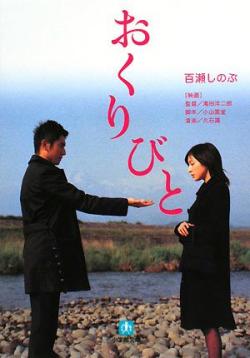Okuribito

2008, 131 minutes
Review by Susan Meehan
Okuribito (Departures), winner of the 2009 Oscar for “Best Foreign Language Film,” upsetting the much talked about Walzing With Bashir, opens with a mesmerising winter scene in the photogenic Shōnai area of Yamagata Prefecture and doesn’t fail to continue impressing, amusing and tugging at the heart strings.
His career as a cellist in tatters, halted when the orchestra he plays with is rudely dissolved, Daigo Kobayashi, played by heart throb Masahiro Motoki – who erupted onto the scene in the 1980s with the all boy band “Shibugaki Tai,” then going on to star in several films, including “Sumo Do Sumo Don’t” – returns to his native Sakata from Tokyo. With hardly a penny to his name, the idea is to live rent-free in his deceased mother’s home.
Eager to find work, in order to support his steadfast wife, Mika, Daigo applies for a job at NK Agency “assisting departures.” He is invited to an interview and in the humorous scene which ensues, is given the job on the spot. Having imagined NK Agency to be a tourist agency, Daigo is perturbed to find that he will, in fact, be assisting those “departed” from this world. Receiving a wad of money from his lugubrious new employer and with no other job prospects in sight, Daigo becomes an unwitting and unlikely “mortician.” He has never been near a dead body – his grandparents died when he was very little, his mother died when he was abroad and his father has not been seen since leaving home when Daigo was six – so how will he fare with cleaning cadavers and making them look beautiful?
Daigo regards his newfound work as a trial or perhaps a punishment for having left his mother. He takes his job seriously, soon finding it fulfilling and becomes extremely fond of his quirky colleagues. (I found it improbable, but not a real problem, that Daigo’s occupation is, on the whole, portrayed as a 9-5 job despite the fact that death doesn’t abide by this routine.)
Daigo tries to keep the exact nature of his job secret from his wife – she knows he works in “ceremonies” and imagines this to mean weddings. When Mika, played by Ryoko Hirosue, finally discovers the true nature of Daigo’s job, she becomes disgusted and finds him filthy. A childhood friend also deserts him, regarding him as “polluted.” Daigo, the consummate professional, resolutely carries on with his job, ultimately earning his detractors’ and audience’s respect and admiration.
The film, hilarious and sad in turns does a lot to dispel the taboo of death and rehabilitate those that who have jobs which involve dealing with the dead. My only complaint is that some of the scenes drag. Other than this it is a fine and enjoyable film despite the subject matter.
I pondered how such a film would be made in a multicultural country. Set in the UK there would be scope to focus on all sorts of eccentricities: eco-friendly coffins; references to Mr Ghai, the devout Hindu hoping to overturn a Newcastle Council decision preventing funeral pyres; humanist ceremonies and unusual funeral songs for starters.
Motoki plays the role of his life in this film, showing tremendous versatility and sensitivity, and is well deserving of the accolades it has brought him. The director of NK Agency and Daigo’s boss, Shōei Sasaki, played by Tsutomu Yamazaki, is also outstanding.
The film won Best Film, Best Director (Yojiro Takita), Best writing (Kundo Koyama), Best Actor (Masahiro Motoki), Best Supporting Actor (Tsutomu Yamazaki), Best Supporting Actress (Kimiko Yo), Best Cinematography, Best Film Editing, Best Sound Mixing, Best Lightings at this year’s 32nd Japan Academy Prize.

